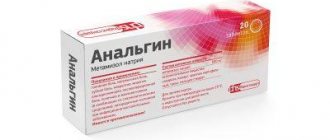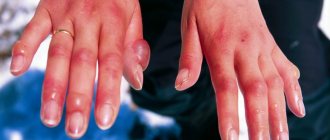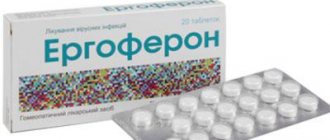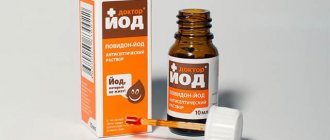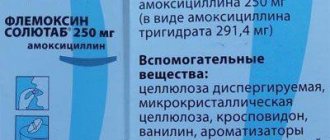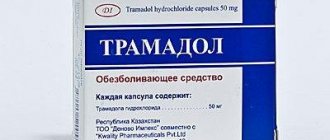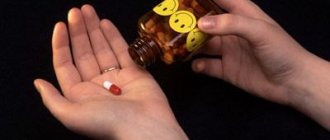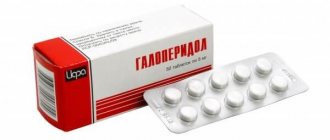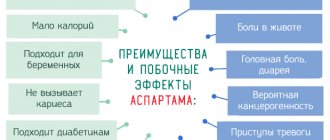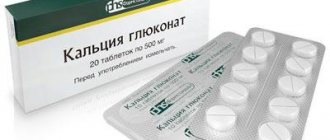Andipal is a combination drug with a pronounced analgesic and antispasmodic effect . Taking it incorrectly can lead to severe and dangerous poisoning and even death. This article discusses an overdose of andipal, its symptoms, consequences, causes of development, as well as first aid methods and treatment components.
Indications and contraindications for taking the drug
Andipal can be found in any pharmacy and you can buy this medicine without a prescription from your doctor. It consists of the following components:
- Analgin;
- Dibazol;
- Papaverine;
- Phenobarbital.
These components have a calming effect on the patient, relieve spasms and relieve pain.
The drug can be bought without a prescription, but you should not take it yourself . It can only be prescribed by the attending physician, who determines the correct dosage. The doctor must develop an individual dosage regimen and name the exact number of tablets that can be taken during the day. Self-administration, without consulting a specialist, can lead to disastrous consequences and cause serious harm to the patient’s health.
Andipal is prescribed in the following cases:
- migraine;
- severe headache and toothache;
- colic of various origins (intestinal, renal, hepatic);
- pain during menstruation;
- after surgery.
Not everyone can take the medicine. Before use, be sure to familiarize yourself with the contraindications, which can lead to death.
Andipal is contraindicated:
- children under 8 years old;
- for intestinal diseases;
- pregnant women and during lactation;
- for prostate problems;
- if you are allergic to the components of the drug;
- for glaucoma;
- with eye pressure;
- for kidney diseases;
- for heart disease (in particular, angina and coronary artery disease).
Features of Andipal's action
This is a combination drug with analgesic, antispasmodic, and vasodilator properties.
When taken orally, it has an antipyretic, analgesic, sedative effect, and relieves spasms of the smooth muscles of blood vessels and internal organs. Improves collateral blood circulation.
Andipal is an analgesic with antispasmodic and vasodilating effects
Dibazole in Andipal expands peripheral blood vessels and brain vessels, stimulates spinal function.
Papaverine hydrochloride lowers blood pressure, Phenobarbital gives a sedative effect and enhances the effect of other components of the drug.
The main active ingredients of the anesthetic are Analgin (0.25 g), Dibazol (0.02 g), Phenobarbital (0.02 g) and papaverine hydrochloride (0.02 g). Auxiliary components: stearic acid, starch, calcium stearate, talc.
Main indications for use of Andipal:
- algodismenorrhea,
- intestinal, renal colic,
- biliary dyskinesia,
- spasms of the bladder, ureters,
- postcholecystectomy syndrome,
- pain syndrome after surgery,
- migraine,
- essential (primary) hypertension,
- unspecified pain syndrome,
- spasm of cerebral vessels.
Andipal is not prescribed for renal, cardiac, liver failure, angle-closure glaucoma, intestinal obstruction, prostatic hyperplasia, angina pectoris.
The use of an analgesic is contraindicated in case of individual intolerance to the active components, inhibition of bone marrow hematopoiesis, pregnancy (first trimester) and lactation.
Andipal enhances the toxic effect of ethanol on the body and inhibits the functioning of the central nervous system.
Alcohol intoxication sets in faster and hangover symptoms become more severe.
Due to the increased load, the liver suffers, the cells of which have to process not only alcohol, but also medicine.
Experts recommend giving up alcohol while taking Andipal.
Is it possible to drink Andipal after alcohol for a headache? No, combining the drug with ethanol-containing drinks is prohibited.
This causes severe intoxication of the body, nausea, uncontrollable vomiting, headache, and general weakness. The malaise will intensify and the hangover will take much longer than usual.
If you use Andipal and alcohol, there is also no compatibility before starting treatment. Ethanol metabolites are eliminated from the body within 3–8 hours with a single dose.
The speed of cleansing the body depends on gender, age, weight, the presence of concomitant diseases, and the dosage of alcohol.
If you take a pill before the body has cleared ethanol, there is a risk of developing chemical intoxication with serious complications.
Is it possible to take Andipal with alcohol? How does alcohol affect the functioning of internal organs? Ethanol, like an analgesic, is broken down in the liver, which doubles the load on the digestive organ.
Decay products are excreted by the kidneys; with alcohol poisoning, the urge to urinate becomes more frequent, useful minerals are washed out of the body along with urine, and the pH of the blood is disturbed.
Andipal and alcohol can cause the following side effects:
- dizziness,
- drowsiness, lethargy,
- nausea, vomiting, constipation,
- lowering blood pressure,
- allergic reactions up to anaphylactic shock,
- ataxia,
- depression (especially in elderly and frail patients),
- internal bleeding,
- exacerbation of peptic ulcer disease,
- collapsed state.
With long-term treatment, Andipal and alcohol compatibility manifests itself in the form of leukopenia, thrombocytopenia, agranulocytosis, liver and kidney dysfunction.
When using the drug simultaneously with alcohol, the side effects are more pronounced and can lead to serious complications and even cause death.
Combining Andipal with alcohol increases alcohol intoxication and side effects
Is it allowed to combine Andipal and alcohol? How long after taking the last pill can you drink? The active ingredients of the drug accumulate in internal organs and in brain cells. The half-life is 2–4 days, so you can drink alcohol no earlier than 5 days after the end of treatment.
Combining Andipal and alcohol is contraindicated. The drug enhances the effect of ethanol several times.
The simultaneous use of an analgesic with alcohol can cause disruption of the liver, kidneys, central nervous system, cause internal bleeding and cause death.
Andipal is a combination drug with a pronounced analgesic and antispasmodic effect. Taking it incorrectly can lead to severe and dangerous poisoning and even death. This article discusses an overdose of andipal, its symptoms, consequences, causes of development, as well as first aid methods and treatment components.
In what cases can an overdose of Andipal occur?
An overdose is possible during self-medication, when the patient does not know how many tablets to take per day or does not comply with the doctor’s instructions.
Reasons why an overdose occurs:
- Taking medication in large doses. During an attack, the patient wants to relieve the pain as quickly as possible and can take several tablets at a time. The lethal dose of Andipal is 25-35 tablets (depending on the patient’s weight and physical condition).
- Taking Andipal for a child under 10 years of age.
- Incorrect combination of Andipal with other medications. The medicine contains many components that cannot be combined with other drugs. For example, Andipal does not combine with painkillers, nitroglycerin, cardiac and diuretic tablets and drops. If you cannot give up other medications while taking Andipal, then you should give up the secondary medication or replace it with another one. Under no circumstances should you select a medication without your attending physician.
- Drinking alcohol while taking Andipal.
Possible consequences of combined use
Andipal and alcoholic drinks, when present in the body at the same time, enhance their mutual effect. Even if you take this drug a few hours after drinking alcohol, it can cause severe poisoning of the body.
Although the pharmacological characteristics of the drug seem quite suitable for relieving pain syndromes after intoxication of the body with alcohol, the combination of ethanol and the active components of Andipal is fraught with dangerous consequences.
The substances that make up the medicine can interact with alcohol molecules and have a toxic and stressful effect on the body. Even a small amount of alcohol (a glass of wine or a glass of beer) during a course of drug use can lead to irreversible consequences. If Andipal is prescribed to you, it is better to avoid alcohol-containing drinks completely.
As a result of the combined use of Andipal and alcohol, the following may occur:
- Internal bleeding;
- Perforation of gastric and small intestinal ulcers;
- Strokes;
- Mental disorders;
- Nausea, vomiting and other signs of severe poisoning;
- Brain coma.
In addition, alcohol and Andipal are toxic to the liver and, if consumed simultaneously, can lead to the development of failure of this organ. The load on the excretory system also increases, which can also cause kidney dysfunction.
If a person nevertheless takes the medicine together with alcohol and adverse reactions occur, measures should be taken to remove the components of the drug from the body. You can rinse your stomach by first drinking 1-2 liters of warm water or taking a sorbent (Activated Carbon or Polyphepan).
It is advisable to seek help from a medical institution, where a complete cleansing of the body of toxins - detoxification - will be carried out. If necessary, infusion therapy can be used - a dropper or even hardware blood purification.
Andipal is a fairly common and well-known remedy, actively used as a powerful analgesic. In addition to a good antipyretic and analgesic effect, this medication also has a pronounced vasodilator effect. Andipal is a drug with a wide range of therapeutic uses, so it is often included in the permanent contents of home medicine cabinets.
But what to do if there is some kind of celebration coming up, and as you know, not a single holiday in our country is complete without a rich table with plenty of booze. What is the compatibility between Andipal and alcohol? Is it possible to combine these drugs? This important issue needs to be discussed in more detail.
Andipal is an effective vasodilator and antipyretic agent
Before finding out whether you can drink Andipal after alcohol, you should find out about the specifics of this medication. Andipal belongs to the class of combined antispasmodic and analgesic drugs. The medicine owes its high effectiveness to its composition. The main active ingredients of the drug are:
- Bendazole (or dibazole). It has a powerful antispasmodic effect, promotes vasodilation, lowers blood pressure and effectively stimulates the performance of the spinal cord. Bendazole is an immunomodulatory substance that significantly alleviates a person’s condition during vascular spasms. It is used to treat various neurological problems.
- Papaverine hydrochloride. Has a strong vasodilating effect. With large doses of this medicine, doctors achieve a decrease in the overexcitability of muscle tissue and stop the increased excessive excitability of the myocardium (heart muscle).
- Phenobarbital. Its work includes enhancing the activity of the remaining components of the medicine and at the same time calming overly active manifestations of the body. Phenobarbital is an antiepileptic drug that has a hypnotic effect.
- Metamizole sodium. Helps reduce the manifestation of pain impulses, effectively reduces high temperature, stopping fever and feverish conditions.
Andipal is a combination drug that has a vasodilator, analgesic and antispasmodic effect. This medicine is effective for high body temperature.
Features of the medicine
The drug is available in tablet form and can be successfully used for headaches, high blood pressure, and cerebral vasospasm. It effectively blocks pain in the gastrointestinal tract and relieves muscle spasms. Although the pharmaceutical industry now provides more advanced drugs with similar effects, Andipal has enjoyed great success due to its affordability.
Before starting treatment with Andipal, you should carefully study the instructions, especially the paragraphs on contraindications and side effects
On average, the course of treatment with this medication is 5–10 days. Usually take the medicine three times a day, 1-2 pills (unless special instructions from the doctor). You should know that long-term use of this drug is prohibited, since phenobarbital, which is part of the tablets, can cause addiction to the body. This medicine is used in the following pathological situations:
- migraines of various nature;
- mild stage hypertension (primary and secondary hypertension);
- relief of muscle spasms in the gastrointestinal tract and blood supply system;
- pain that developed against the background of spasm of cerebral vessels and smooth muscles;
- pathologies of the central nervous system and pathological phenomena that remain after damage to the nerves of the peripheral system.
Special instructions for use
If you are going to be treated with this remedy, you should remember that Andipal is not intended for long-term use. If after 3 days from the moment of treatment the patient does not notice an improvement in his condition, this medication is discontinued and replaced with another drug. If the course of treatment extends for more than a week, the patient must carefully and regularly monitor the condition of the liver and blood composition.
Andipal pills belong to the category of narcotic analgesics and require special precautions during treatment.
In particular, when undergoing a course of therapy, it is necessary to temporarily refrain from driving vehicles and other activities that require a good and immediate reaction. One that requires increased concentration and sharpness of psychomotor functions.
Indications for use
Andipal has no absolute analogues in composition. But if this medication is not available or if it is impossible to take, it can be replaced with another medicine that is as close as possible to Andipal in its therapeutic effect. Its analogues are the following drugs:
- Unispaz;
- Urolesan;
- Nomigren;
- No-shpalgin;
- Papazol-UBF;
- Theodibaverin.
Contraindications for use and side effects
Like other effective medications, Andipal has a number of specific contraindications. According to the annotation for the medicine, Andipal is prohibited from being used in the following cases:
- anemia;
- tachyarrhythmia;
- weakness of muscle tissue;
- intestinal obstruction;
- liver and kidney diseases;
- various blood diseases;
- increased body temperature;
- angle-closure glaucoma;
- pregnancy and lactation;
- intestinal obstruction;
- age limit (up to 8 years);
- lack of glucose-6-phosphate dehydronase in the body;
- existing sensitivity to the components of the drug;
- porphyria (hereditary disorder of pigment metabolism);
- hyperplasia (cellular growth) of the prostate gland;
- pain of various types (stomach, headache, intestinal);
- chronic heart failure (decompensated).
When using this drug, you should be very careful and carefully listen to the well-being of patients with various head injuries. When the permissible dosage is exceeded, patients experience the following manifestations:
- increased blood pressure;
- loss of vision;
- general weakness;
- noise and ringing in the ears;
- severe dizziness;
- respiratory depression (shortness of breath);
- general poisoning of the body;
- nausea leading to vomiting;
- motor retardation;
- the appearance of depression;
- stomach upsets (constipation or diarrhea).
Metamizole sodium, which is part of the drug, has its own specific reactions. They may occur as a result of significantly exceeding the recommended dose of the drug in the form of:
- chills;
- drowsiness;
- bronchospasms;
- lung collapse;
- sudden changes in blood pressure;
- leukopenia (drop in white blood cell level);
- hyperthermia (excessive accumulation of heat in the body);
- development of renal pathologies (such as nephritis, hematuria, anuria);
- agranulocytosis (disappearance of neutrophilic granulocytes from the blood);
- allergies in the form of skin rashes (rash, eczema, urticaria, rarely angioedema).
Symptoms of drug poisoning
Symptoms of an Andipal overdose appear within half an hour. If the patient has taken a large number of tablets, then within 10-15 minutes the first manifestations of poisoning appear. The severity depends on the number of tablets taken. If the poisoning is severe, then the person does not notice how he loses consciousness and, in most cases, death occurs.
Main symptoms of overdose:
- drowsiness;
- worsening condition;
- severe weakness;
- lethargy. The patient does not react or takes a very long time to comprehend what is happening around him;
- severe stomach pain;
- nausea;
- vomit. The vomit contains tablets, so try to save them until the ambulance arrives;
- the heartbeat is practically not audible. It is very difficult to feel the pulse, so doctors may mistakenly declare death.
- coma. This symptom appears only in cases of severe poisoning;
- disturbance of consciousness;
- low blood pressure.
The consequences of an overdose of this drug are quite serious. The following diseases may develop:
- heart failure and other heart diseases;
- gastritis;
- renal failure;
- liver failure;
- anemia;
- hepatitis caused by toxic substances.
What does Andipal help with?
Andipal tablets, what are they prescribed for? Medical prescriptions suggest the use of medication to eliminate the symptoms of various types of migraines:
- Pain associated with spasms of cerebral vessels in the head.
- The medicine helps against pain caused by spasms of smooth muscles or internal organs of the gastrointestinal tract.
- For mild forms of hypertension, it can be used as blood pressure pills.
- For primary or secondary hypertension, Andipal can be taken for high blood pressure.
The drug is able to reduce high blood pressure (blood pressure) in a short time and can be used for severe migraines or vascular spasms in the brain. Andipal can help with pain caused by spasm of smooth muscles and gastrointestinal tract organs, such as gastritis and the like. Can be used as an adjuvant drug in the treatment of hypertensive crisis. It is allowed to take the drug situationally, in case of a sharp jump in blood pressure.
First aid to a patient
As mentioned above, Andipal poisoning manifests itself very quickly. If you notice that a person taking this drug begins to complain of weakness and poor health, then you should think about an overdose. In this case, you cannot hesitate, because... any minute can save a person's life. Call an ambulance immediately and do not self-medicate, as it can be fatal. The condition of the poisoned person will worsen every minute.
After the ambulance is called, you need to begin providing first aid. The patient should not be left alone and you need to constantly talk to him so that he does not lose consciousness.
Actions that will be useful before the ambulance arrives:
- Rinse the stomach. You need to try to remove all the pills from your body. If the patient is conscious, even vaguely, try to find out how many pills he took. Force the poisoned person to drink clean water (usually 2-3 glasses are enough) and induce vomiting. If the poisoned person is unconscious or the vomit is dark, then these activities should be stopped.
- Make the poisoned person drink sorbents. This can be any drug, for example, activated carbon. The correct dosage is indicated on the package; usually 15 grams of the product is enough. The patient is unlikely to drink a whole tablet, but crushed ones can be poured into his mouth.
- The patient should be given as much fluid as possible. It can be either plain water or mineral water. Even if he refuses, force him to do it.
Compatibility
Since the drug helps in eliminating pain of various etiologies, many people try to cope with hangover syndrome with its help. However, the instructions clearly indicate that Andipal should not be taken either before or after drinking alcohol. Even without alcohol, tablets can lead to side effects such as nausea, a sharp drop in blood pressure, lethargy and drowsiness, and when combined with alcohol it is impossible to predict the reaction. One thing is clear - Andipal greatly enhances the effect of alcohol, which is extremely dangerous and can lead to very unpleasant consequences.
If you drink the drug after drinking alcohol, its effect will be akin to a toxin. Then the consequences can be very, very disastrous, so it is better to refrain from combining these substances.
In addition to alcohol, the drug is also inadmissible for:
- Anemia with increased blood clotting;
- Renal and hepatic pathologies;
- Carrying a child and breastfeeding him;
- Myasthenic weakness of muscle tissue;
- Hereditary porphyrin pathology, which consists of disruption of pigment metabolic processes;
- Individual intolerance.
Treatment of overdose
After the ambulance arrives, doctors begin providing basic care to the patient. First of all, they stabilize the heartbeat and breathing of the poisoned person. For this purpose, medications are used that are administered intravenously. To reduce intoxication, the patient is given a drip with saline solution.
The poisoned person should be hospitalized. Treatment is usually carried out in a hospital under the close supervision of specialists. But if the patient’s condition is serious, then he is placed in intensive care.
Treatment consists of the following components:
- IV complex;
- antiemetics;
- diuresis;
- medications that normalize blood pressure and restore heart function;
- hemodialysis. It is carried out only in case of severe poisoning;
- elimination of complications that arose after severe intoxication. Doctors identify the problem and carry out therapy in this direction.
In addition, the patient is prescribed a series of tests that show the general condition. Ultrasound and ECG are also needed. If the stomach pain does not stop within several days, the patient is prescribed a gastroscopy.
Recently, a psychologist has been talking to all patients. He tries to identify the cause of the poisoning and, if it was done intentionally, works on the patient’s mental state.
special instructions
This drug belongs to the types of pharmacological agents that can be taken during severe pain and spasms, however, you should not abuse it, as an overdose may occur and the body will begin to react in a not the most pleasant way. In addition, Andipal does not treat the causes of the disease, but calms and eliminates their symptoms. If pain occurs very often and their nature is similar to each other, then you should immediately seek help from a specialist who will help find the cause of the disease.
If you take care of your own health every day, eat right, exercise and undergo a full body examination every year, then the need for synthetic drugs will decrease several times or disappear completely. The main thing you need to remember is that Andipal or another pharmacological agent is a medicine that cannot be combined with alcoholic beverages in order to avoid negative consequences, because in some cases they are irreversible.
All materials on our site are intended for those who care about their health. But we do not recommend self-medication - each person is unique, and without consulting a doctor you cannot use certain means and methods. Be healthy!
How to take pills so as not to get poisoned?
In order not to get poisoned while taking the drug, you must follow all the doctor’s recommendations and follow certain rules:
- Do not take a large number of tablets at once.
- Combine the tablets correctly.
- Different drugs should not be taken together.
- Do not use expired medications.
- Follow all your doctor's instructions.
- Before taking the tablets, carefully read the instructions for use.
- During the treatment of various diseases, different specialists prescribe drugs that are not compatible with each other. None of these drugs can be stopped. Therefore, before taking it, you need to visit a therapist who will distribute the medications and draw up the correct dosage regimen. If necessary, replace one drug with another, which will be combined with Andipal.
- Medicines must be stored strictly as prescribed. Never leave medications in the bathroom or freeze syrups. Any medicine should be kept away from children and avoid direct exposure to sunlight.
Andipal is an effective drug that can be useful for many diseases. But do not forget that any medicine should be taken only after consultation with your doctor. If during administration the first signs of an overdose appear, immediately call an ambulance and do not ignore the advice of specialists.
Prevention
To prevent an overdose of Andipal, you must follow a number of simple rules:
- do not exceed the dose recommended by the doctor, as well as the duration of therapy,
- before starting treatment with Andipal, you need to warn the doctor about all medications you are taking, since some of them may increase the likelihood of an overdose of an antihypertensive drug,
- It is not recommended to take ethanol during treatment with Andipal,
- The tablets should be kept out of the reach of minors and persons with mental illness.
Despite the fact that Andipal is an over-the-counter drug, you should not take it without consulting a doctor, and especially in doses higher than those recommended in the instructions, since an overdose can cause irreparable harm to health.
Analogs
Analogs of Andipal include drugs based on similar components. In cases where this remedy is not suitable for lowering blood pressure, other remedies are prescribed. Having similar ingredients and properties, these medicines have differences in price and contraindications, so they are taken strictly on the recommendation of a therapist. The best substitutes for Andipal are:
- Kapoten;
- Captopril;
- Nomigren;
- Theodibaverine;
- Unispaz;
- Urolesan forte.
Captopril Analdim Papazole Urolesan Unispaz
